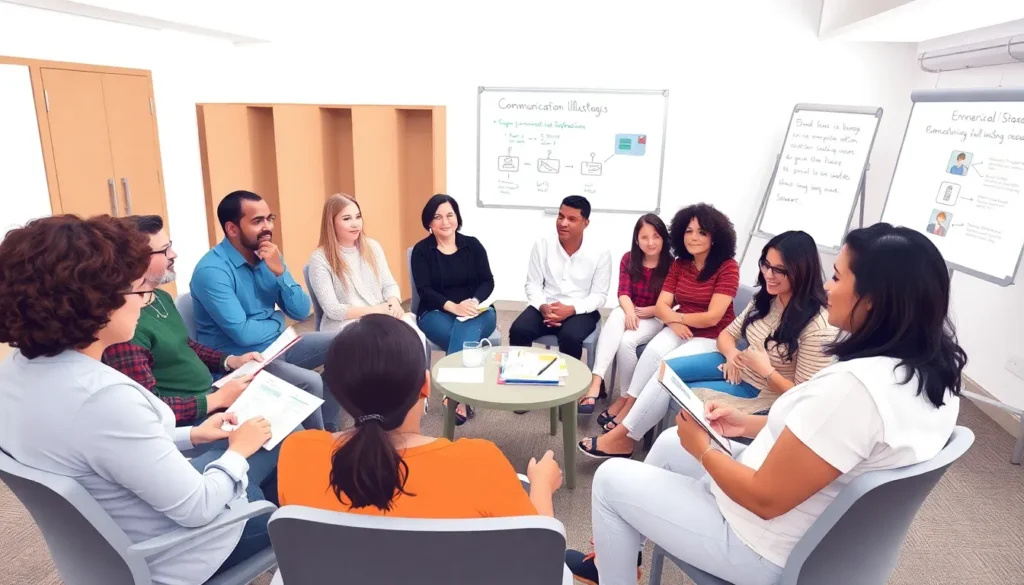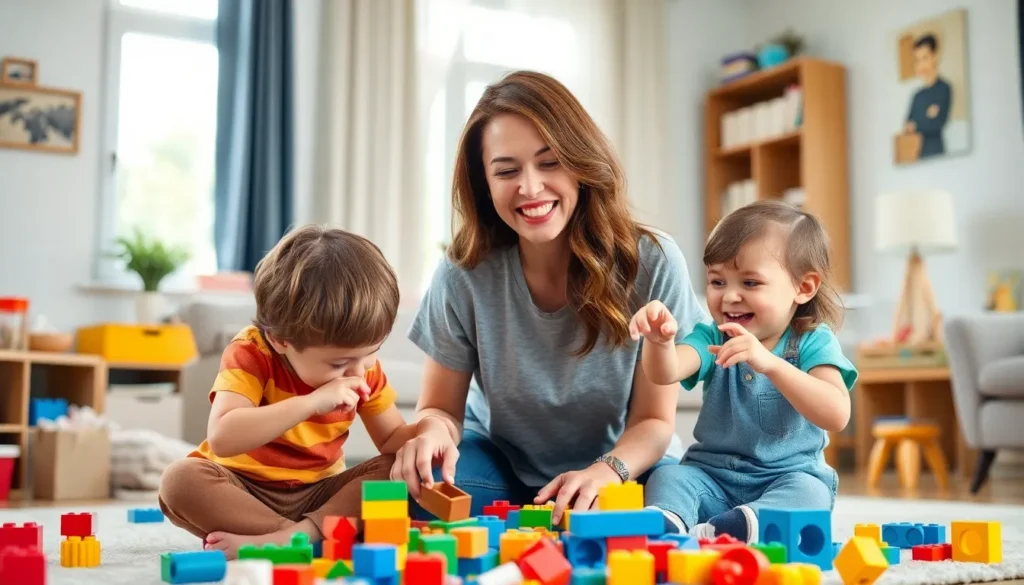Navigating the wild world of co-parenting can feel like trying to assemble IKEA furniture without instructions—confusing and often frustrating. But fear not! Co-parenting classes are here to transform that chaos into a well-oiled parenting machine. These classes offer more than just a crash course in sharing custody; they provide essential tools to help parents communicate effectively and put their kids first.
CO Parenting Classes
Co-parenting classes provide essential resources for parents navigating shared custody. These classes enhance communication skills and teach conflict resolution strategies. Participants learn how to foster a healthy environment for their children amidst challenges. Effectively managing differences in parenting styles is a key focus.
Topics covered often include emotional support for children and creating consistent routines. Parents gain insights into co-parenting agreements and legal considerations. Building cooperative relationships with ex-partners strengthens co-parenting dynamics. Role-playing scenarios allow participants to practice skills in real-life situations.
Online options for co-parenting classes have become increasingly available. Flexibility in participation accommodates busy schedules. Many courses also offer certification upon completion, providing credibility to the skills learned.
Research indicates that engaging in co-parenting classes reduces parental conflict and benefits children’s emotional health. Statistics show that children from cooperative co-parenting arrangements tend to perform better academically and socially. Classes also encourage parents to prioritize their children’s needs over personal grievances, leading to more stable family environments.
Valuable resources often accompany these classes, such as access to counselors and legal experts. Networking opportunities with other parents also enhance support systems. Overall, co-parenting classes significantly contribute to more effective co-parenting relationships.
Benefits Of Co Parenting Classes

Co-parenting classes offer numerous advantages for parents managing shared custody. Parents build essential skills, improve their children’s environment, and enhance their relationships with ex-partners.
Enhanced Communication Skills
Participants refine their communication techniques during co-parenting classes. They learn to express thoughts calmly, facilitating clearer discussions. Strategies taught in the classes allow parents to handle disputes respectfully. Role-playing exercises prompt real-life interactions, fostering effective dialogue. Establishing these skills significantly reduces misunderstandings and tension. Improved communication results in a cooperative dynamic, benefiting both parents and children alike.
Improved Child Well-being
Attending co-parenting classes leads to better emotional health for children. Parents gain insights into child psychology, allowing them to respond appropriately to their kids’ needs. Classes emphasize the importance of creating a stable environment. Children thrive when both parents collaborate on consistent routines and shared expectations. Studies show that children from supportive co-parenting arrangements excel academically and socially. Focusing on children’s welfare helps parents prioritize their offspring over personal conflicts, creating a healthier family atmosphere.
Types Of Co Parenting Classes
Co-parenting classes come in various formats, catering to the diverse needs of parents. Each type offers unique benefits and focuses on specific challenges.
Online vs. In-Person Classes
Online classes provide flexibility and convenience, fitting into busy schedules effectively. They often include interactive elements, allowing participants to engage from anywhere. In-person classes offer face-to-face interaction, which enhances relationship-building among parents. Direct communication fosters deeper connections and enables real-time feedback. Many parents appreciate the opportunity to share experiences in a group setting. Both formats ensure access to essential skills and knowledge, aiding in effective co-parenting strategies.
Specialized Classes For Different Situations
Specialized classes target unique circumstances, ensuring parents receive relevant support. Classes for high-conflict situations equip parents with tools to manage emotions and improve communication. Classes for parents of children with special needs focus on tailored strategies, addressing specific challenges faced during co-parenting. Some courses center on blended families, helping parents navigate the dynamics of integrating new family members. Each specialized class supports parents in their specific journeys, reinforcing collaboration for better child outcomes.
What To Expect From Co Parenting Classes
Co-parenting classes provide structured learning experiences for parents. Each class focuses on equipping participants with the skills necessary for effective co-parenting.
Course Structure And Duration
Most classes typically consist of several sessions, spanning from six to eight weeks. Each session covers distinct topics, such as communication strategies, conflict resolution, and child development insights. Parents engage in interactive exercises, group discussions, and role-playing, which facilitate practical application of skills. Flexibility in scheduling often accommodates diverse parental commitments. Additionally, some classes offer online formats, enhancing accessibility. Expect each session to last about one to two hours, ensuring efficient use of time while maximizing learning opportunities.
Facilitator Qualifications
Qualified facilitators play a crucial role in co-parenting classes. Many possess backgrounds in psychology, social work, or family therapy. Credentials often include licenses or certifications that demonstrate expertise in family dynamics. Their experience ensures they can effectively address diverse co-parenting challenges. Facilitators also bring practical knowledge in conflict resolution techniques and child development. Participants benefit from their guidance, receiving tailored advice based on real-world scenarios. Overall, knowledgeable facilitators create a supportive atmosphere that fosters open dialogue and mutual respect, enhancing participants’ learning experiences.
Conclusion
Co-parenting classes are a vital resource for parents navigating the complexities of shared custody. By enhancing communication skills and providing valuable strategies, these classes empower parents to prioritize their children’s well-being.
With options available both online and in-person, parents can find a format that fits their schedules while gaining insights tailored to their unique situations. The benefits extend beyond personal growth; children thrive in environments where parents work together amicably.
Investing time in co-parenting education not only fosters healthier relationships between parents but also creates a more stable and supportive atmosphere for children. Ultimately, these classes pave the way for a cooperative co-parenting journey that benefits everyone involved.



